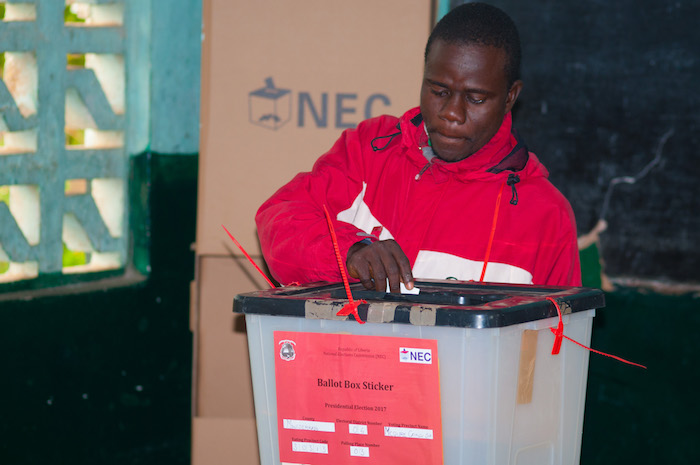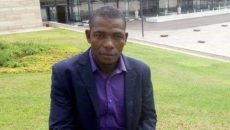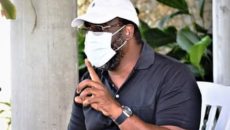MONROVIA, Montserrado – In previous articles, The Bush Chicken has explored recommendations for improving future elections made by elections observer missions, including the Elections Coordinating Committee, which had the highest number of local observers.
The Bush Chicken also subsequently reached out to influential journalists who covered the 2017 elections cycle, including John Kollie of the Liberia Media for Democratic Initiative, the BBC’s Jonathan Paye-Layleh, and the veteran Frank Sainworla of the Public Trust Media Group.
Those journalists shared their thoughts on the need for improving future elections after weaknesses in the country’s electoral system were exposed during the last general and presidential elections. Some of those ideas differed significantly from the general consensus held by-elections observer missions.
For example, like many observer missions, Sainworla identified the potential that the existing elections timeline could cause a constitutional crisis or be adversely affected by the rainy season as one of the most serious electoral reform topics.
The prolonged legal battle after the first round of elections that created fears that there would not be enough time to hold a runoff election and inaugurate the new president within the timeframe required by the constitution did not only prompt a need to reconsider the constitutional timeline for elections, but also drew attention to the data within NEC’s voter roll, which contained duplicate data and other symptoms of a database that had not been subjected to rigorous data quality requirements.
The Elections Coordinating Committee, a consortium of civil society organizations working on elections in Liberia and international observer missions, including the Carter Center, European Union, African Union, ECOWAS, and the National Democratic Institute in their findings of the 2017 elections had proffered several recommendations for electoral law reform.
The recommendations included an amendment to the elections timetable to avoid constitutional crises in future elections and to mitigate the effects of the rainy season.
But Kollie suggested that the electoral timetable remain the same if the reason for the change is mostly because of bad roads network and logistical challenges during elections. In 2017, Kollie’s LMDI was the premiere organization holding debates during the election season. LMDI held 57 legislative debates, 4 presidential debates, and a debate for vice presidential candidates, by far more than any other organization.
He said politicians must go through the bad roads to canvass for votes, as it will give them an experience of difficult life situations affecting ordinary citizens, so they can tackle them when they are elected.
The BBC’s Paye-Layleh added that one of the major issues with the 2017 elections was the congestion in the NEC electoral calendar and delays in the implementations of electoral activities.
“NEC didn’t start most of their work in time; and because of this, there were lapses here and there; for example, only five days — April 12 to April 17 — was allotted to a key aspect of the electoral process which is voter roll verification. This was ridiculous,†Paye-Layleh wrote in an email.
“This means the voter roll was never really verified.â€
He believes that more than half of registered voters probably didn’t get to know whether their names were included and properly placed on the voter roll.
He said despite the Supreme Court’s mandate for NEC to clean up the voter roll prior to the runoff presidential elections, such was not properly achieved.
“We seemed to have to go to the second round with the same old voter roll,†he stressed.
Indeed, after the Supreme Court’s ruling that instructed the National Elections Commission to clean up its voter roll, The Bush Chicken reported that two days before the runoff elections, many individuals reported having issues with the voter roll, including the outgoing representative of Nimba’s ninth district, Matenokay Tingban, who said he could not find his name on the voter roll.
Although the BBC correspondent partly blamed the late provision of funds for delays in the implementation of electoral activities, Paye-Layleh also noted that the commission needed to allow more time to its activities and improve its communication strategy by directly engaging voters through community radio stations.
“The process should be taken to the people in time; the awareness should not be about some groups of musicians riding on floats on the streets of Monrovia,†he added.
Kollie agrees on this point, adding that the irregularities and contestations seen during the 2017 and other previous elections were driven mostly by the lack of adequate education for voters.
Kollie said he thinks the National Elections Commission does not prioritize the education of voters.
“When elections come and go, NEC sits back and waits for another election before conducting civic voter education,†he said.
Instead of waiting for an election before carrying out civic voter education, he wants NEC to remain engaged with the population for a sustained civic voter education.
“There needs to be a continuously sustained voter civic education in this country,†he stressed.
He said the root cause of most of the challenges observed with the 2017 elections was the lack of proper civic voter education, which meant that most of the population did not understand their rights and responsibilities in national elections.
Kollie thinks the potential for conflicts can be minimized if voters are properly educated prior to elections.
“People should be told that power search is not a desperate search. It’s just an opportunity. So, when they don’t win, the election should not be marked by violence,†he said.
That inadequate civic voter education, Kollie said, can also contribute to poor turnout of voters, resulting in the wrong people being voted into office.
As all stakeholders recognized the need for change to the voter registration system to ensure it is no longer plagued with issues observed during the 2017 elections, all major international observer missions had recommended the nascent National Identification Registry for NEC to use in obtaining its voter roll. The European Union’s mission emphasized the need for this system to be passive as a means of “enhancing participation in elections and addressing uncertainties inherent to active voter registration.â€
With the current system, NEC sets a limited period before each election for voters to register. Unlike with the National ID cards, current voter registration cards are handwritten, and individuals’ biometrics are not captured and stored electronically. Moreover, because of the limited timeframe, and because of the manual nature of the work to create the voter ID cards, there is a higher chance for errors or mistakes. It is also easier to forge the cards.
While this was not one of the recommendations included in the ECC report, its chairman, Oscar Bloh, wrote in an email to The Bush Chicken where he agreed that voter registration should be ongoing. He also said NEC should explore the opportunity to leverage the database at the National Identification Registry. In addition to the quality control benefits, he said this would contribute immensely to reducing the cost of holding elections.
But both Sainworla and Kollie were wary of using the National ID Registry, viewing it as an abdication of the duties of NEC.
Sainworla proposed that NEC fix its problems with obtaining the voter roll in future elections, rather than escaping to the National Identification Registry, which he said has not been tested for any process.
Kollie told The Bush Chicken that information gathered from the NIR’s ongoing national citizens registration suggests that the process is not vigorously challenging anyone’s citizenship and that non-Liberians were also being issued citizens identification card as legal citizens of Liberians.
“To succeed in life, you have to face all your troubles head-on. Go ahead with the NEC, just make sure that the voter roll is better next time,†he said.
“The problem in this country is that we are too lazy. We are quick to run away from the real thing. So, do your voter roll whether you deal with biometric or not, still do the voter roll. That’s the solution to the problem.â€
Sainworla also proposed that the NEC voter roll process be reviewed and made credible during future elections, instead of directly adopting the NIR data.
While the National ID Registry will incorporate non-citizens, the system is expected to be sophisticated enough for a distinction between non-citizens and citizens, as is done in many other territories, including all U.S. states, which tie their voter roll to driver’s licenses and other forms of identification that can be accessed by non-citizens.

The observer missions also proposed an amendment of the National Elections Law to make it binding on political parties to prioritize women’s representation. However, Kollie, who also won this year’s Press Union of Liberia’s Journalist of the Year award for his work during the 2017 elections, disagreed on the need for a change in the law to ensure that women have better representation.
The elections law provides that political parties and coalitions submitting candidates for an election should “endeavor†to ensure that there is no less than 30 percent of candidates from each gender. That vague language meant that the law would be difficult to enforce, and no political party met the gender requirement.
“I think that women should step up to the plate, go to school, and get more opportunities,†he said. He added that the first step to women’s empowerment is education, as women account for a larger portion of the illiterate population in Liberia. He said educating more women would better address the problem of low women political participation.
“So, one woman is vice president now; all the others illiterate. After her, what next?†he said.
Sainworla also agreed with Kollie that the focus should be on creating an equal playing field for both men and women in politics.
Another recommendation by observers, mainly the African Union and the ECC, was the need to publicly fund political parties to promote a level playing field. Sainworla agreed with such a provision, although he said such a law should not be used to regulate political parties. Proposed laws on publicly funding political parties have provided that a political party can be suspended if it receives less than two percent of the total of all valid votes cast for candidates in the constituencies in which it contested.
However, Kollie feared that publicly funding parties would create room for people to form political parties just to get money.
“That will be moneymaking. That will be business now,†he said.
He added that having a new law to regulate the existence of political parties to benefit from the public fund would also undermine the multi-party democracy the country has taken so long to achieve. He suggested that the law remain as it is, and political parties self-regulate.
On another matter, the two media executives jointly disagreed on the reduction of the number and tenure of members of NEC’s board of commissioners. The ECC had argued that five (instead of seven) commissioners were enough to implement laws, policies, and regulations governing elections.
But Sainworla and Kollie did not see the current number and tenure of commissioners as a major problem affecting the electoral system. The two journalists, and Paye-layleh, however, agreed with the ECC that extrajudicial powers be detached from NEC’s responsibilities.
Instead of setting up an extra body to adjudicate elections disputes, Kollie said elections disputes should be adjudicated directly by the courts.
Paye-layleh called for NEC to be given stronger autonomy and the judiciary have a direct oversight on the adjudication of cases involving electoral disputes.
But Lamin Lighe, NEC’s executive director, said there are benefits to having NEC first hear elections dispute, instead of having an extra tribunal set up exclusively for elections dispute.
Lighe said the current line of responsibilities given to the elections commission to be the first to handle elections disputes is not unique to Liberia. He believes that NEC should keep its judicial power because he said the board of commissioners, which hear appeals, does not involve itself with operations.
He noted that setting up an extrajudicial body would require additional funding, especially when elections are not conducted every year and the government would have an extra burden of maintaining the special tribunal in place.
Paye-layleh also had many ideas that touched on topics not raised by the observer missions. For example, he called for the constitution to be amended to not only state that a president and vice president cannot come from the same county (as it currently states), but to include a prohibition against the president and vice president coming from bordering counties.
“Preferably, a candidate from Grand Cape Mount, for example, should take a running mate from far away Maryland or Sinoe,†he noted.
Paye-layleh also suggested that, for the sake of transparency, civil society organizations and representatives of registered political parties should be involved or allowed to monitor the processes of printing ballot papers for future presidential elections.
“They should see the printing of ballots and know the exact number printed. They will always be able to match leftover ballots with those actually used,†he said.
Already, the House of Representatives of the 54th national legislature has welcomed recommendations to improve future elections and promised to complete legal reform in six months.
This article is a third of four in a series on electoral reform. It is published by The Bush Chicken through the support of Internews. Read articles one, two, and four.
Featured photo courtesy of Lloyd Massah



